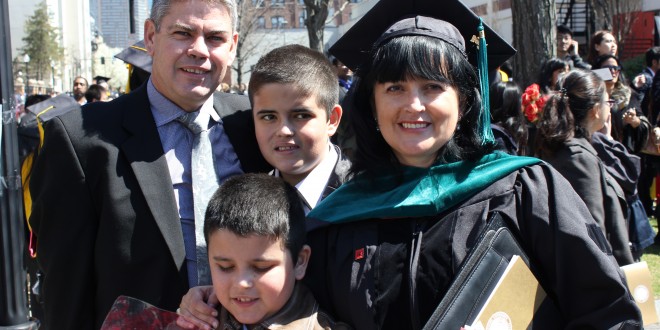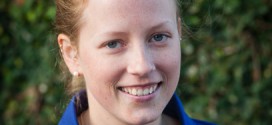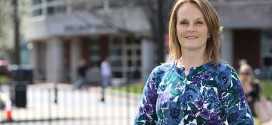Earning a doctorate degree is an incredible feat. But what’s even more incredible than earning it? What you can do with it.
The following is the story of Petronella van der Merwe, who has beat the odds again and again to get where she is today: A savior to her autistic son, and working to use physical therapy to help HIV patients in South Africa. Not bad for a woman who was told she couldn’t practice medicine.
A passion for PT
What if you were not allowed to follow your dream because of your gender? You’d be mad.
Petronella Van der Merwe certainly was.
“I wanted to study medicine, but wasn’t accepted because the universities accepted mostly men at the time,” she said.
But she decided to go for what she could obtain at the time: A degree in physical therapy.
And the rest is history.
“I fell in love with physical therapy (PT) when my course started,” she said. “I knew that it would challenge me.”
This was in the 1980′s in South Africa, specifically Kempton Park, the country’s most populated province. Physical therapists were scarce. Not everyone saw the need and there were few trained professionals.
After school, with job prospects at home scarce, she spent five years in America as a physical therapist PT for Travelcare USA, which took her to Louisiana, Florida, North Carolina, and Pennsylvania. She returned to South Africa in 1997 to start an occupational-based private practice, implementing the U.S. rehabilitation, ergonomics, and work hardening principles, which were still very new there.
“I wanted to open a practice right away, because my head was filled with exciting new American ideas,” she said. “I was able to apply new principles in rehabilitation and ergonomics in my work with the less fortunate black population, which was greatly rewarding.”
An unforeseen change
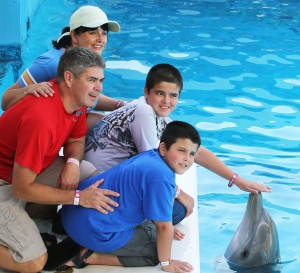 Just as she was finishing her master’s degree in orthopaedic manual at the end of 2007, Van der Merwe’s 5-year old son, Liam, was diagnosed with autism. In order to home school him, she sold her practice, set up a small home-based PT practice, and ran community service exercises classes at the retirement centers on the side.
Just as she was finishing her master’s degree in orthopaedic manual at the end of 2007, Van der Merwe’s 5-year old son, Liam, was diagnosed with autism. In order to home school him, she sold her practice, set up a small home-based PT practice, and ran community service exercises classes at the retirement centers on the side.
For three years, she focused on Liam, and was glad to be able to apply PT to help him achieve the developmental goals to be accepted into mainstream school. When Liam was able to attend school, Van der Merwe revisited her career goals.
The road to Northeastern
Looking for her next step, Van der Merwe discovered Northeastern University’s College of Professional Studies Transitional Doctor of Physical Therapy (tDPT) program, which is designed for practicing physical therapists and offered online. She said she was drawn to stay ahead of the research curve and implement new evidence-based practices. And because it was offered online, she could access the program from her home in South Africa.
“I was ecstatic when I was accepted,” she says. “Who won’t be? Boston represents excellence in education and is known all over the world. For a person from an (almost) third-world country in Africa it was like a dream come true.”
Over the next year and a half, Van der Merwe continued to run her orthopaedic private physiotherapy practice while earning her professional doctorate degree. While the six-hour time difference between South Africa and Boston wasn’t a problem for the online courses, the time change did have one downside.
“After class I’d go to bed and then jump back out because an idea popped into my head,” she said. “I think I got a bit over stimulated because the lectures and my fellow students’ conversations were so interesting.”
A life-changing course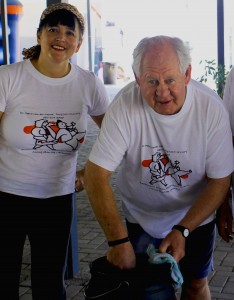
Van der Merwe said the tDPT program had immediate effects on her. “Because of its emphasis on evidence-based practice, it’s made me a more well-rounded therapist,” she said. “ I felt rejuvenated in my work.”
Bursting with newfound confidence and enthusiasm, Van der Merwe wanted to share her knowledge with colleagues and create public awareness about the role PTs have to offer in people’s paths to recovery. So she’s joined the South African Physiotherapy Society (SAPS), where she sits on the journal’s review board and helps with public relations efforts to promote the professional image of physiotherapy.
She’s also spreading the word about the benefits of tDPT and DPT programs themselves.
“I’ve been approached to help the South African universities and the SASP in finding a way in incorporating the DPT as a post-graduated degree,” she said. “I’m certain Northeastern will be a great resource for this.”
It’s a small world
In addition to learning what she could to improve her own practice, Van der Merwe has also been sharing what she’s gleaned from her community service work, especially the impact physical therapy has on HIV patients and the older adult population through fall prevention programs.
“The government’s goal is that all South Africans should be allowed access to basic, affordable healthcare, irrespective of the area that they reside in,” she said. “Community service group classes play a vital role in this, and I want to help get them running all over South Africa.”
She published her tDPT capstone project on fall prevention among older adults and was recently selected to present it at the SASP symposium in Port Elizabeth, South Africa. There, she had a chance encounter with Northeastern’s Meredith Harris, PT, DPT, EdD, who was the chairperson for Northeastern’s physical therapy program and who knew the Van der Merwe’s capstone project mentor.
The coincidence was two fold: Harris had visited South Africa on vacation and got involved with community service exercise classes.
“It was like destiny, since we share so many common passions,” said Van der Merwe. “It’s sad that there are so many people in South Africa who don’t have access to physical therapy. Most people are never referred for physical therapy and don’t know anything about it. I share professor Harris’ frustration in the system and incentive to fix it.”
Looking ahead
Through her capstone project and involvement with the community services, Van der Merwe developed a passion for both research and teaching. This has inspired her to consider her next step—a PhD—and she’s considering two U.S.-based programs.
“I want to go back to the United States for school some day, but I will bring the American structure and discipline here to South Africa in the meantime,” she said.
She’ll also be able to keep applying her skills to her son, who has improved his speech, muscle tone, and concentration through treatment.
“My classes on motor control and normalizing the sensory integration processes have been a constant resource,” she said. “I’ve actually experienced the wonder of the filed first-hand, as he’s improved. And I feel like I’ve become the physical therapist I always wanted to be.”
